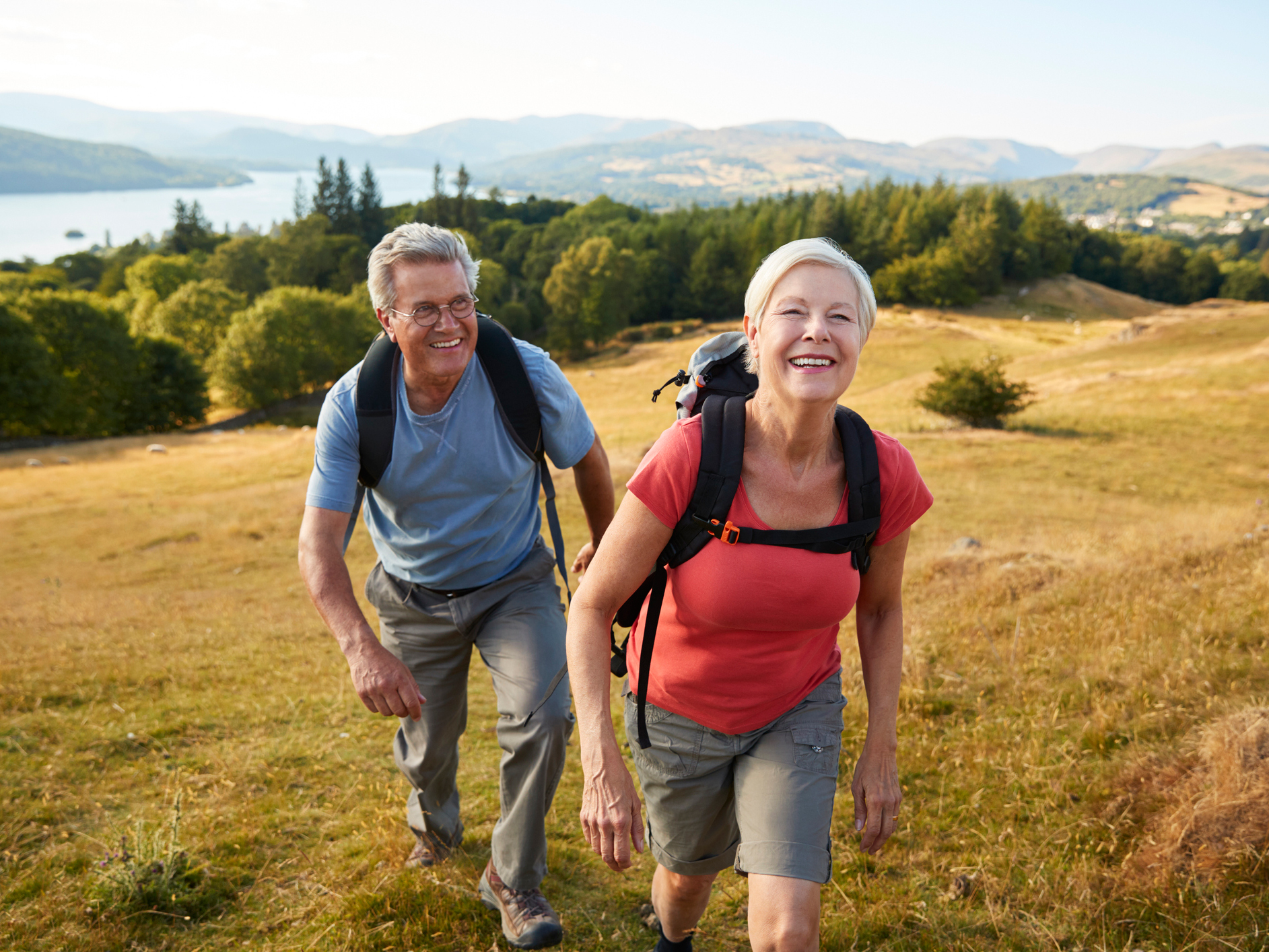Get Easy Health Digest™ in your inbox and don’t miss a thing when you subscribe today. Plus, get the free bonus report, Mother Nature’s Tips, Tricks and Remedies for Cholesterol, Blood Pressure & Blood Sugar as my way of saying welcome to the community!
For strength, longevity and happiness, take a hike!

It’s been many years since I did any hiking. I’m talking decades here.
But with the summer coming, I’m considering buying a pair of boots and hitting the trail.
Not a difficult trail, mind you. After all these years, I consider myself a novice hiker again, and I wouldn’t tackle any strenuous climbing or anything I couldn’t complete in a few hours at a leisurely pace.
But you might be thinking, why not just go for a good, long walk around the neighborhood? Wouldn’t that be just as good, and less hazardous?
Less hazardous, perhaps. Hiking or walking an uneven trail does leave you open to rolled or twisted ankles and sprained knees, not to mention bug bites.
Nevertheless, I’m headed for some local trails this weekend. Let me tell you why.
The difference between walking and hiking
At first glance, walking and hiking may not seem that different. But the benefits of hiking are indeed different from the benefits of a stroll around the block.
Daniel Ferris is a professor of engineering and biomechanics at the University of Florida. He explains that walking on flat terrain allows the body to just keep going without a lot of effort.
He compares this to the perpetual swinging of a pendulum.
Ferris found that when you walk on uneven terrain, be it a nature trail or a sandy beach, your body uses 28 percent more energy.
Not only that, but his 2013 study at the University of Michigan uncovered benefits that go beyond calorie burning.
When you navigate uneven ground, “you’re turning on and strengthening a lot of muscles in your hips and knees and ankles that you don’t normally use.”
Using and building those neglected muscles can improve your balance and stability, which can protect you from falls. Also, using various muscle groups cuts down your risk of injuries from the overuse of knees and hips.
And it’s not just your body that’s healed and supported by hiking…
Hiking and mental health
A Stanford University study found that spending time in nature calms a part of the brain that research has linked with mental illness, and lowers the tendency to “ruminate,” a term that psychologists use for negative thought patterns that lead to anxiety and depression.
Other studies found similar benefits:
- A University of Michigan study showed that walking in nature boosted working memory for persons with mild depression, while walks in an urban environment did not.
- A 2010 review of research strongly suggests that time spent in forests is beneficial to the human immune system.
- And a study just last year showed that spending time in nature can reduce the risk of cardiovascular disease, diabetes, and hypertension.
Walk if you can’t hike for stress-relieving benefits
If hiking is a little too strenuous for you, that’s ok. Just getting out in nature to walk or even sit has benefits for you…
According to the American Psychological Association, at least half of all Americans are living with chronic stress.
This unrelenting release of stress hormones is linked to the six leading causes of death: heart disease, cancer, lung diseases, accidents, cirrhosis of the liver and suicide.
A recent study determined that spending just twenty minutes a day in contact with nature can lower stress hormone levels.
“We know that spending time in nature reduces stress, but until now it was unclear how much is enough, how often to do it, or even what kind of nature experience will benefit us,” says Dr. Mary Carol Hunter, an Associate Professor at the University of Michigan and lead author of this research.
“Our study shows that for the greatest payoff, in terms of efficiently lowering levels of the stress hormone cortisol, you should spend 20 to 30 minutes sitting or walking in a place that provides you with a sense of nature.”
So, whether you can hike a nature trail, walk the beach, or camp out on a park bench in a wooded park — communing with nature can rejuvenate your mind and body. It’s a fact.
Editor’s note: Discover how to live a cancer prevention lifestyle — using foods, vitamins, minerals and herbs — as well as little-known therapies allowed in other countries but denied to you by American mainstream medicine. Click here to discover Surviving Cancer! A Comprehensive Guide to Understanding the Causes, Treatments and Big Business Behind Medicine’s Most Frightening Diagnosis!
Sources:
- Why Hiking Is the Perfect Mind-Body Workout — Time
- Biomechanics and energetics of walking on uneven terrain — The Journal of Experimental Biology
- Nature experience reduces rumination and subgenual prefrontal cortex activation — PNAS
- It’s official — spending time outside is good for you — University of East Anglia
- Urban Nature Experiences Reduce Stress in the Context of Daily Life Based on Salivary Biomarkers — Frontiers in Psychology













